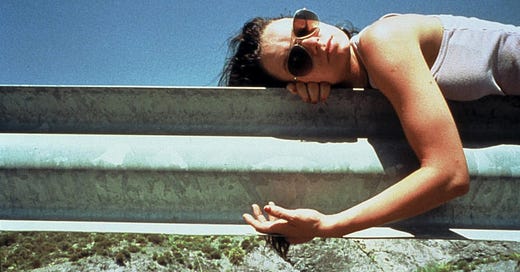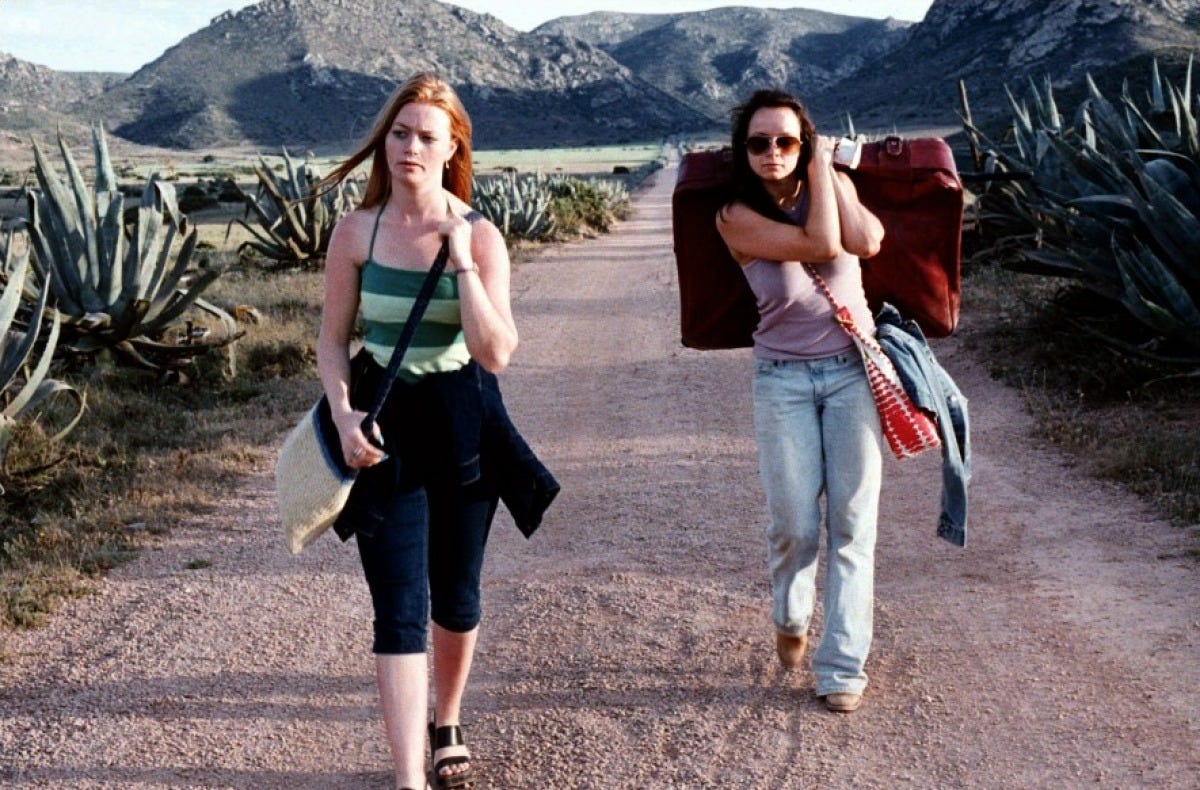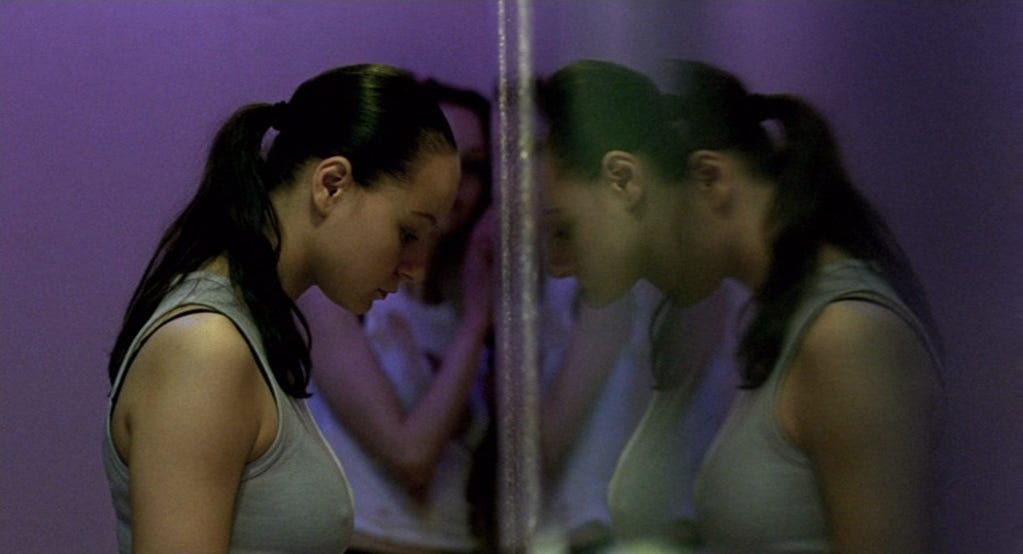‘Morvern. MOR-VERN,’ enunciates our protagonist down the phone, and to hotel clerks, and seemingly ad infinitum. It’s lightly comic; a necessity so that whomever she’s talking to can say her very Scottish name correctly. In Morvern Callar, Lynne Ramsay’s 2002 film, actress Samantha Morton embodies a pallid slip of a twentysomething woman with a name as knowingly obfuscating as she is, and a fearsome urge to fill a certain hollowness that leads her to strange and exciting places.
On inspection, Morvern Callar is also a name that doesn’t even really sound like a person’s, so much as it does a place. A quick search online for it shows me that it has a few meanings in old Scottish - ‘big gap’ or ‘the sea gap’ are among the most commonly mentioned. Say what you will about nominative determinism, but Morvern is a name taken from a geographical feature defined by division and lack; something that’s missing.
At the start of the film, Morvern is faced with the first and obvious gap in her own life. In an incident of sudden, mind-reeling horror, she finds her live-in boyfriend face down on the threshold of their bedroom, stripped to the waist, wrists slashed: he’s committed suicide. But Ramsay’s visual style is remote, her camera never dwelling on the gruesomeness or on any emotional histrionics. She is an elusive filmmaker with a glancing style, asking viewers to fill in the blanks, ever more so as Morvern’s response to the trauma is to dash off into the night with a pal and go to a house party soundtracked to Can. Morvern doesn’t call the authorities: she leaves her boyfriend’s prone body there. Eventually she begins to make excuses to friends for his disappearance, saying that he’s left her; when it becomes impossible to ignore it any longer, she disposes of his body. And because she’s just Morvern, a checkout girl in the local supermarket who likes to go out and get smashed every weekend like everyone else, people are disinclined to notice anything might be amiss.
At first, her behaviour might be accounted for by shock, or by grief that won’t allow her to part with the corpse. Maybe it’s even fear that she might be wrongly associated with the suicide, or pitied to such an extent that she will be treated differently by the small town she lives in. Some of that might be true, in bits and pieces. But deeper, more troubling questions crop up as Morvern’s moral ambiguity tips into something else. She steps around his rotting corpse like you would a pile of laundry as she makes a frozen pizza. She takes the money he has left behind for his funeral to go on a rager in Spain with Lanna (her outgoing best friend, played by Kathleen McDermott, a first-time actor Ramsay discovered on the street in Glasgow. McDermott tackles the part with a memorable combination of giggly good nature and a certain stubborn provincialism). And then, in what is perhaps Morvern’s craftiest moment, she deletes her boyfriend’s name from his novel’s manuscript, taking it to a publisher per his wishes, but under her own name instead.
Morvern’s crimes are possibly more interesting because they are glancing ones. She’s not a murderer or accessory to a murder, not a mastermind or schemer. Ramsay’s realism regarding her criminal activity extends so far as to let her bury an entire human body with a garden trowel. She is not responsible, as far as any of us can tell, for precipitating her boyfriend’s death or for any other violence, though were she to be caught keeping secrets after the fact there would certainly be some tricky questions. Through whatever ambiguous motivations, she simply fails to report the death.
Perhaps in order for a girl like Morvern - a nobody, a girl in a small Scottish town with no special claim to a talent or gift of the gab or anything much at all - to gain any equilibrium in a game of power requires something extreme. She may not have control over the tragedy that has darkened her doorstep, but Ramsay never gives the sense that this is a young woman who is forced or thrown into any of her decisions: at each juncture, she makes a conscious choice to do what she does, no matter how illegal it is.
Given the opening, you’d assume this is a film which should be about tragedy and grief. The words are mentioned often if you read any reviews or essays about the movie. But I find myself a little perplexed by the interpretations of Morvern Callar as a film about an allegorical or symbolic attempt at flight, of a woman who is simply dealing with her grief differently than others might expect. To me, it seems to be a film about the actual gap in the film: the gap where more traditional grief should be, the gap between expectation and reality. A life which should be forever ruptured instead unfurls gloriously in front of Morvern. As a result of her undoubtedly callous choice to hide the suicide, money and freedom await.
Samantha Morton is remarkable in the central part, in a startling performance of dislocation and borderline stoicism. And yes, there’s something which resembles sadness in Morvern, but only when you squint. Iit never seems to keep its hooks in her long. She’s too busy smoking and barrelling forward, disassociating to ‘Some Velvet Morning’ in her headphones and careening through messy, eyeliner-smeared nights out. In moments of gorgeously-rendered paradox, she listens to indie love songs from a Christmas mixtape her boyfriend made for her, while she - dry-eyed and methodical - fillets his corpse like a supermarket fish in her bathtub.
In one of the most dread-inducing moments of the film, Ramsay leaves the gore largely unseen to us, allowing instead for curiously poetic arcs of arterial blood to crawl up and slowly pattern her bare arms. What to make of this juxtaposition of matter-of-fact horror and seemingly earnest romanticism? Sure, there are moments of perhaps-delusional peripheral tenderness or obligatory mourning, but they never once stop Morvern from hitting the gas and doing precisely what it is she has chosen.
Is Ramsay pointing us in the direction that this man may have been an abusive partner? It’s possible: Morvern does, increasingly, seem freer and happier as the film goes on. But Ramsay is not a director who seems inclined to rationalise or justify in this way, and it seems suffocatingly obvious to suggest it. And if anything, we might be inclined to see this man as a victim, certainly of his own mental health struggles; the straightforward but seemingly heartfelt note he leaves his girlfriend, cursor still blinking ominously in the sterile word doc on his computer, telling her to ‘be brave.’ (She certainly takes that advice, in a fashion.)
We don’t get to know this man, or wonder who might be looking for him; we don’t get much of a sense of the pair’s relationship but for the mixtape and the note, both of which seem to suggest a loving partnership but perhaps are also one-sided at best, sentimental claptrap at worst. I think this is the kind of ambiguity which might frustrate some viewers and critics: how bad was this guy?
But maybe he wasn’t particularly bad at all, at least not in any overtly abusive or obviously repellent way. What if he were just a typically exhausting, navel-gazing boyfriend of the early 00’s? What if he was one of those guys who have nothing remarkable about their monstrousness - just someone in love with his own misanthropy and literary seriousness? Flippant with his girlfriend, careless, making her playlists with Can and The Velvet Underground on them less out of real romantic feeling than out of a cool-kid-playbook to prove his cultural superiority. Consciously self-absorbed, the dominant personality of the relationship, the tortured novelist to Morvern’s minimum wage party girl. Imagine all the slights, the quiet belittling, the class gap we sense in the film but never are party to; the humiliations over those years building to a towering rage at the moment his power, with all his blood, seeped away. She may not have wished him dead, but now that he is, so be it.
Toward the end of the film, in a tenuous, reality-stretching, and nonetheless fantasy-fulfilling scene, Morvern meets with two urbane publishers who simply adore her (stolen) novel. They want to give her a £100k advance, freeing her from ever needing to remain in her hometown again. Asked by critic Gerald Peary in an interview what her protagonist might do after the conclusion to the film, Ramsay joked: ‘Write another book?’ There’s mercenary pleasure - and unpunished reward - in Morvern’s bad behaviour.
Morvern’s name - once so indicative of lack, of emptiness, of something no one can get a handle on or bother trying to get a handle on - is about to grace a book cover. No one will forget it anytime soon.
~~~~~~~~
I’d like to thank you, from the bottom of my heart, for subscribing to Sisters Under the Mink. It’s a project that is very close to me, and due to some tumultuous personal/life events in the better part of the past year, a project that became difficult for me to sustain and make time to do while full-time freelancing.
This month, I’ll be back again to further examine the work of one of our greatest directors - nevermind female directors - Lynne Ramsay, and her expansive attitude toward gender in the crime genre.
I am thrilled to be bringing Sisters Under the Mink back to you, and hope to re-introduce further extras, audio-visual elements, interviews, and lively discussion in the very near future. Stay tuned!







Great piece about a film I (shamefully) haven't seen but now very much feel like I should seek out.
I was interested by the thoughts on whether the relationship might have been abusive in some way and what that means for the reading of the film. Do you think that impulse to rationalise or contextualise behaviour is something that's grown over the years (maybe even since Morvern Callar was made), or was it always there? Just wondering if I could imagine a version with Barbara Stanwyck as a straight villain.